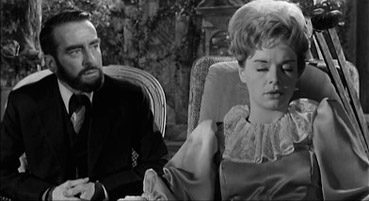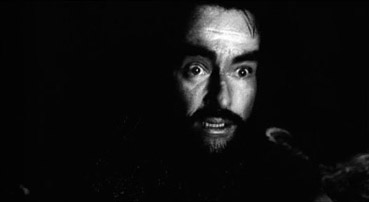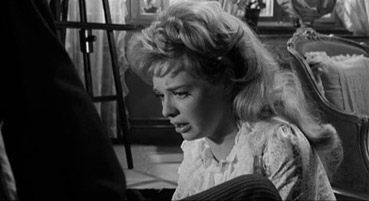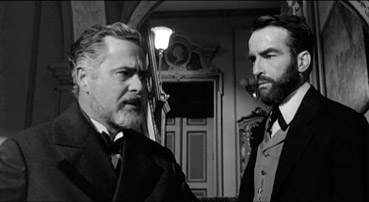| |
"That crap's going to eat through the hull! That thing's going to eat through the goddamn hull!" |
| |
Capt. Dallas (Tom Skerrit) figuring out what alien
acid can do to his ship's structural integrity |
| |
"Obviously one must hold oneself responsible for the evil impulses of one's dreams. In what other way can one deal with them? Unless the content of the dream rightly understood is inspired by alien spirits, it is part of my own being." |
| |
Sigismund Schlomo Freud (I know, what a great
middle name. It's Jewish, meaning 'God's Peace') |
A Brief Paragraphic Aside...
Alien fans have no choice but to start watching Freud with an emotional frisson that immediately plunges you, terror-struck, deep into the cramped corridors of the starship Nostromo and the trouble the crew are having with some local fauna. There are at least two music cues from Freud used in key dramatic moments in Alien, scenes Jerry Goldsmith scored in 1979 but whose cues were subsequently replaced by his earlier work for director John Huston in 1962. Who knows who was responsible and whether the director and editor had fallen hard for the temp track (the cues you use to help a rough cut before you get a bespoke score written). It happens. And because a cut is worked and reworked, you get used to the temp track. You may even think nothing could replace it. Temp tracks cause a great deal of ambivalence in composers. Goldsmith wasn't a great fan. He said it was like asking someone to not think of an elephant... When I asked Jerry why this replacement of his original work happened, his answer was telling... "Because the editor's got a big music collection..." His wariness towards those who held power over his work was never successfully hidden but I know for a fact that replacing his entire score for Legend (described as monumental by one executive) was a blow that hit very hard.

So echoes of Freud exist, in of all things, one of the most Freudian of all horror films. It's a terrific score, compact, atonal and emotionally expressive and, incidentally, it was Goldsmith's first Oscar™ nod. And so I now have a chance to see the movie for which it was written. I will try very hard not to imagine Dallas succumbing to the alien in the ventilator shafts when that particular piece of music sneaks up on me...(I failed – see later). Released, presumably, to ride the wave of pre-publicity granted to Freud's more recent cousin, David Cronenberg's A Dangerous Method coming out next month, this movie arrived on DVD last month. Despite the lateness of this review (long hours in overseas work is the culprit this time), the release is long overdue. Featuring what's hailed as Montgomery Clift's last great performance, this fifty year old movie was born from a shoot that must have been, uh, 'fraught' given that Huston had adopted Clift on The Misfits only to find out that the actor was gay and in the process of a painful mental breakdown. Coupled with heavy drug and alcohol misuse, Clift was open regarding his homosexuality on the set (something the actor was reportedly hitherto deeply guilty about) and his co-star in Huston's previous movie, a certain Marilyn Monroe once described Clift as "The only person I know who is in worse shape than I am..." Being an overt man's man (whatever that actually means) and a bully-director at the best of times, Huston allegedly pushed Clift through a singular hell. Whether Huston was anti-gay is a moot point. As ever, context is all and all we know of both men is their work and snippets you pick up from the information source I will euphemistically refer to as 'the usual suspect'. We are so reliant on the internet these days but I do want to point out that I'd prefer to have better sources when people's creative reputations are brought out for a good thrashing. What remains is the work and Freud is utterly fascinating.
Now, comedy lovers beware. Freud is a movie so bereft of whimsy, light and smiles that even though its merits are easily accessed and enjoyed, it will not convince you that human beings ever enjoy the heavy burden of their own lives. We are all, presumably, so dragged to the ground by neuroses (and old ones), parental strife, guilt, fear and anxiety, it's a wonder we can get out of bed in the morning. As a child I was fascinated by the now rather obvious revelation that all we are – early in life – is absolutely governed, pummelled and shaped by our parents' efforts at bringing us up. Yes, the Philip Larkin poem is always relevant (and the less famous third and fourth lines go "They fill you with the faults they had, And add some extra just for you"). The idea that there was a way to offset and penetrate the powerful effects of trauma in early life struck me as exciting to the degree that I did all those things young men do in the pursuit of enlightenment. The only conclusion that I came to, (wanting to rid myself of painful baggage) was that I had no painful baggage. As loathe as I was to admit it, I was a normal child raised by loving parents and had not a single blot on my emotional landscape. I broke bones (my own) and bone pain is uniquely excruciating but there were never permanent emotional scars that needed exorcising. I was normal, damn it. Such a blow to a prospective rebellious artist. Ha!

Robin Skinner and John Cleese's rather smart book Families And How To Survive Them is a great primer on analysis but for the birth of the discipline (and some still maintain that Freud was an errant fraud) you have to go back to Vienna in the late 1800s and a severe looking bearded chap who put forward a theory that sexuality does not bloom but is there, nestled scorpion-like in the shadows of the sub-conscious, from day one. To say Freud was unpopular with his peers at the time is a gross understatement. These ideas were not seen as great steps forward in psychiatric medicine. They were regarded as the raving idiocies of a well-educated, intelligent man who ought to have known the foolishness of his pronouncements. It's easy to suggest now that his insights have been confirmed by the medical profession over the intervening century-plus since he came up with them but this is a very murky area with no real rules or science to place front and centre as evidence. Freud was not a Galileo of his time, a man whose genius was subsequently proved true by rigorous scientific enquiry yielding stark facts. No wonder the Catholics issued a 'mea culpa' in 1992, regarding Galileo's treatment. In dealing with the mind, you're on much shakier ground. Everything is judged on a case-by-case basis. Like movies, all of Freud's diagnoses were prototypes and if narrow constraining corridors of therapy could be built to help people with unique ailments, then so be it.
Montgomery Clift plays Freud as a man beset by his own anguish trying to find the key to his own mental health and thereby allowing others to benefit. I think he smiles twice in the movie. The rest of his performance is held in check. A more earnest characterisation you'd be hard pressed to find. But Clift is never dull in that earnestness. He is a very attractive performer despite the beard and has a beguiling screen presence. The movie covers the five years in Freud's life in which he formulated what became the birth of psychoanalysis. Whether you believe in the practise and support the idea of being able to talk yourself into mental health will determine your sympathies towards this stark and seriously serious story. Freud discovers hypnotism as a way of getting patients to release pertinent and key information on deeply held neuroses and gradually relents to pure conversation as therapy.

Susannah York plays Cecily, a patient of Freud's colleague suffering from a whole host of psychological ailments. This single character is a dramatic amalgam of many patients that helped Freud formulate his theories of the subconscious mind. York is very convincing as a victim and repressed manipulator and you often believe she is toying with the two doctors' sympathies in order to get attention, the principal reason many doctors dismissed hysteria as pure theatricality unworthy of their ministrations. York is perfectly cast, the coquettish young girl well aware of her attractiveness and yet still 'broken' inside needing help. Understanding that the mind has such a powerful effect on a healthy body is often shocking but true nonetheless. In fact it is scarcely believable hence the time it took to be accepted as true.
Soon to be the Man From UNCLE agent, Illia Kuryakin, David McCallum plays the young man, Carl von Schlossen, who ignites the touch paper of the one theory that Freud has become synonymous with. He is suffering from what's now known as an Oedipal (or Oedipus) Complex named after the unfortunate – and thankfully – mythical fellow who accidently married his mother and killed his father (now, there's a soap opera). And it is at this moment that I admit an affinity with Harry Potter himself, aka Daniel Radcliffe. We are both Tom Lehrer fans (Google the man) and I have to share one of my favourite lyrics before we go any further... The third verse...
"There once was a man called Oedipus Rex
You might have heard about his odd complex
His name appears in Freud's index
'Cause he loooooved his mother..."
And then, as McCallum says the key word in the scene "Mother...", bang! I'm in the air ducts with the Nostromo's Captain Dallas. Odd, isn't it, the power of music. And that initial experience was over thirty-three years ago. To be fair to the movie the music was originally intended for, it also works frighteningly well in its proper context.

Rounding out the cast are two actors soon to go up against No. 6 in the Village. Rosalie Crutchley (the Queen from The Prisoner episode Checkmate) pays Freud's mother and I can't be the first person to notice that she barely looks old enough. If Cary Grant in North By Northwest can have an actress playing his mother who was actually younger than Grant, then this instance has to be notable – both Crutchley and Clift were simply nine months apart in age and there seems to be no make-up effort to age Crutchley up. Soon to be No.2 in the episode Free For All is Eric Portman who plays Freud's principal mentor, Dr. Meynert. The most curious piece of casting is the identity of the narrator. You would think this would be part of Clift's function as the narrator speaks for and as the character Freud in the main body of the film. It is director John Huston (no stranger as an actor either). I'm not saying the voice over was poorly performed but just that there never seemed to be a need for it to be anyone other than Clift. It's a small niggle in what is a curiously involving biopic about that which interests us all – ourselves and what ails us.
Presented, oddly, as a 1.85:1 letterboxed version – not anamorphic – almost underlines the bare bones nature of this release. I'm grateful at having access to this movie at last on DVD but it would have been nice to have been able to take full advantage of the best quality image.
The Dolby Digital 2.0 soundtrack renders Goldsmith's score quite harshly (but then that was probably an artistic intention) but the dialogue is never less than perfectly understandable.
Not even a Freudian slip...
Freud is a strong and sombre drama about life's psychological traumas and the first man who attempted to quantify and cure them. It's a well-acted and very solid movie but stay well clear if you fancy a bit of diverting amusement. Both Freud and A Dangerous Method deal with the fact that movies about people talking are not exactly visually exciting but Huston (and Cronenberg) pull off the drama within the subject in their own very different and intriguing ways. One hell of a double bill.
|